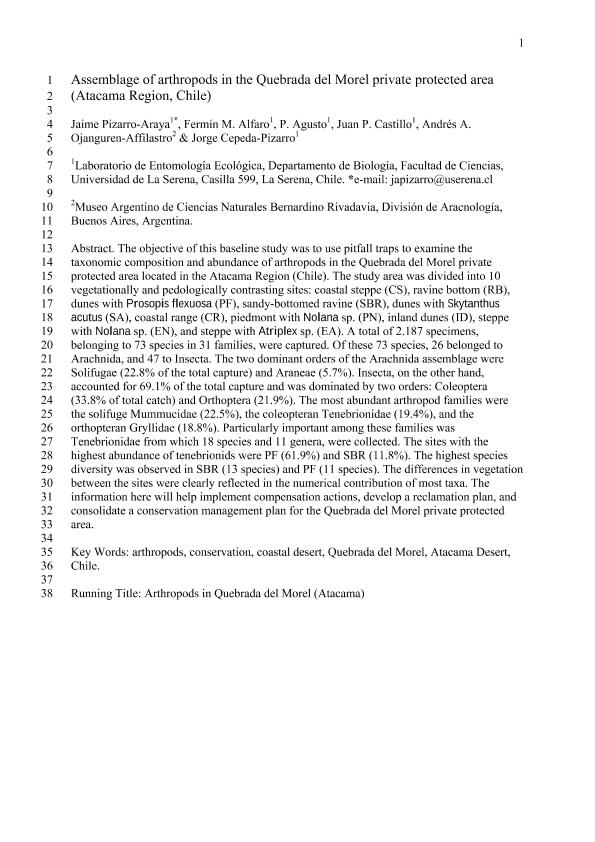Mostrar el registro sencillo del ítem
dc.contributor.author
Pizarro Araya, Jaime
dc.contributor.author
Alfaro Kong, Fermin M.
dc.contributor.author
Agusto, Pablo
dc.contributor.author
Castillo, Juan Pablo
dc.contributor.author
Ojanguren Affilastro, Andres Alejandro

dc.contributor.author
Cepeda Pizarro, Jorge
dc.date.available
2018-08-24T20:22:50Z
dc.date.issued
2012-01
dc.identifier.citation
Pizarro Araya, Jaime; Alfaro Kong, Fermin M.; Agusto, Pablo; Castillo, Juan Pablo; Ojanguren Affilastro, Andres Alejandro; et al.; Arthropod assemblages of the Quebrada del Morel private protected area (Atacama Region, Chile); Pacific Coast Entomological Society; Pan-Pacific Entomologist; 88; 1; 1-2012; 8-21
dc.identifier.issn
0031-0603
dc.identifier.uri
http://hdl.handle.net/11336/57089
dc.description.abstract
The objective of this baseline study was to use pitfall traps to examine the taxonomic composition and abundance of arthropods in the Quebrada del Morel private protected area located in the Atacama Region (Chile). The study area was divided into 10 vegetationally and pedologically contrasting sites: coastal steppe (CS), ravine bottom (RB), dunes with Prosopis flexuosa (PF), sandy-bottomed ravine (SBR), dunes with Skytanthus acutus (SA), coastal range (CR), piedmont with Nolana sp. (PN), inland dunes (ID), steppe with Nolana sp. (EN), and steppe with Atriplex sp. (EA). A total of 2187 specimens were captured, belonging to 73 species in 31 families. Of these 73 species, 26 belonged to Arachnida, and 47 to Insecta. The two dominant orders of the Arachnida assemblage were Solifugae (22.8% of total capture) and Araneae (5.7%). Insecta accounted for 69.1% of the total capture and was dominated by two orders: Coleoptera (33.8%) and Orthoptera (21.9%). The most abundant arthropod families were the solifuge Mummucidae (22.5%), the coleopteran Tenebrionidae (19.4%), and the orthopteran Gryllidae (18.8%). Particularly important among these families was Tenebrionidae which was represented by 18 species and 11 genera. The sites with the highest abundance of tenebrionids were PF (61.9%) and SBR (11.8%). The highest species diversity was observed in SBR (13) and PF (11). The differences in vegetation between the sites were clearly reflected in the numerical contribution of most taxa. This information will help implement compensation actions, develop a reclamation plan, and consolidate a conservation management plan for the Quebrada del Morel private protected area.
dc.format
application/pdf
dc.language.iso
eng
dc.publisher
Pacific Coast Entomological Society

dc.rights
info:eu-repo/semantics/openAccess
dc.rights.uri
https://creativecommons.org/licenses/by-nc-sa/2.5/ar/
dc.subject
Arthropods
dc.subject
Atacama Desert
dc.subject
Chile
dc.subject
Coastal Desert
dc.subject
Conservation
dc.subject
Quebrada del Morel
dc.subject.classification
Otras Ciencias Biológicas

dc.subject.classification
Ciencias Biológicas

dc.subject.classification
CIENCIAS NATURALES Y EXACTAS

dc.title
Arthropod assemblages of the Quebrada del Morel private protected area (Atacama Region, Chile)
dc.type
info:eu-repo/semantics/article
dc.type
info:ar-repo/semantics/artículo
dc.type
info:eu-repo/semantics/publishedVersion
dc.date.updated
2018-08-21T20:59:58Z
dc.journal.volume
88
dc.journal.number
1
dc.journal.pagination
8-21
dc.journal.pais
Estados Unidos

dc.journal.ciudad
San Francissco
dc.description.fil
Fil: Pizarro Araya, Jaime. Universidad de La Serena; Chile
dc.description.fil
Fil: Alfaro Kong, Fermin M.. Universidad de La Serena; Chile
dc.description.fil
Fil: Agusto, Pablo. Universidad de La Serena; Chile
dc.description.fil
Fil: Castillo, Juan Pablo. Universidad de La Serena; Chile
dc.description.fil
Fil: Ojanguren Affilastro, Andres Alejandro. Consejo Nacional de Investigaciones Científicas y Técnicas. Oficina de Coordinación Administrativa Parque Centenario. Museo Argentino de Ciencias Naturales “Bernardino Rivadavia”; Argentina
dc.description.fil
Fil: Cepeda Pizarro, Jorge. Universidad de La Serena; Chile
dc.journal.title
Pan-Pacific Entomologist

dc.relation.alternativeid
info:eu-repo/semantics/altIdentifier/doi/http://dx.doi.org/10.3956/2011-14.1
dc.relation.alternativeid
info:eu-repo/semantics/altIdentifier/url/http://www.bioone.org/doi/abs/10.3956/2011-14.1
Archivos asociados
